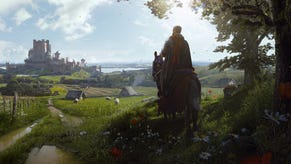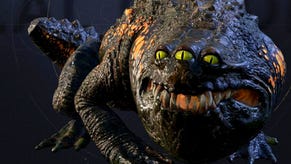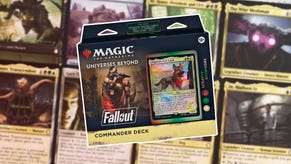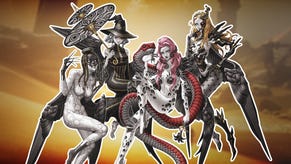USgamer Community Question: What's Your all-time Greatest Shooter?
The question is simple. The choice is almost mind-boggling. What's your favorite shooter of all time?
This article first appeared on USgamer, a partner publication of VG247. Some content, such as this article, has been migrated to VG247 for posterity after USgamer's closure - but it has not been edited or further vetted by the VG247 team.
This week we're switching our focus to shooters. More specifically, your favorite ones. Anything involving some kind of gun counts here, so you can include everything from a simple, classic side scroller to today's most sophisticated first-person shooter. All we want to know is - which one is your all-time greatest?
While you have a ponder on which shooting game rules the roost in your house, here are Team USG's favorite blasting games.
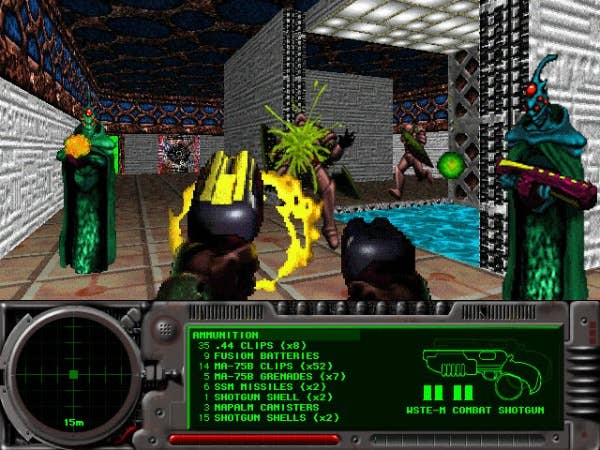
Jeremy Parish, Editor-in-Chief
Oh, you had to go and get tricky on us by lumping arcade shoot-em-ups and FPS all together in a single blob of violence, eh? Wow, it's a toss-up for me between Konami's Life Force (rest in peace, Gradius franchise) and Bungie's Marathon Infinity. But I think I have to go with the latter.
Quite simply, Infinity was the first shooter I ever played whose designers appeared to be self-aware, deliberately playing with the form and technology of the genre in order to deliver an interesting and unexpected experience. They also used the rules of video games themselves for a self-reflexive story. It was way smarter than it had any right to be, given the young genre had already been written off as a stupid and brutish form of entertainment — much smarter than me, in fact. I had to have people explain the whole thing.
Not to get overly pretentious here (too late), but Marathon Infinity is basically the Ulysses of video games. Dense, confusing in its lack of clear start and end points, and ultimately a meditation on the medium and its rules. I guess that would make Bungie its James Joyce. Hmm… James Joyce, Jason Jones. Food for thought, kids.
Anyway, here's a rundown of what makes Infinity continue to stick in my craw after nearly 20 years. First, it featured quite likely the most creative and complex level design ever to appear in the days of 2.5D engines (e.g. Build or DOOM), meticulously crafted both to create a wicked challenge while creating the illusion of much larger spaces than the Marathon engine could legitimately handle by carefully managing lines-of-sight and polygon counts. While enemy AI still tended to be brain-dead, as was usually the case in the pre-Half-Life days, the levels took excellent advantage of their behaviors with careful placement and design. And the addition of extra factors, like the hard time limit imposed by your limited air supply in the vacuum levels, made the action even more intense. It all added up to an incredibly challenging game that obeyed the golden rule: Your frequent failures felt like your fault, not the game's.
Secondly, the story. Man, the story. Bungie had always prided itself on Marathon's narrative, conveyed largely through text terminals and environmental details, but Infinity took it to the next level. After a grim introduction in which the universe was about to die horribly, the player is catapulted through time to find reality's salvation, exploring different timelines in search of a positive outcome, jumping into a new point in the past when the current reality becomes terminal. Allegiances shift and you gain new perspectives on the events of the previous games in the series. Amidst all of this are strange levels "haunted" by inexplicably invisible enemies and the surreal "electric sheep" missions that appear to exist outside of time and seemingly represent the player character (a combat cyborg) gaining self-awareness.
And in the end, both the recursive time loops and the entire concept of failing and trying again from save points become a plot element, too. Infinity did the Edge of Tomorrow thing a couple of decades before the book and film. Of course, none of this is explained in overt terms, so it's all bewildering your first time through. But that's part of what I liked about it, too: Playing the game over and over, trying to unravel its meaning, collaborating with other fans to decode the plot. Much more satisfying than looking up in-game databases and having everything explained through supplemental text. It remains one of my favorite video game experiences ever, made all the more precious for the fact that it simply could never happen today. I kind of feel like Destiny tried, but… yeah.
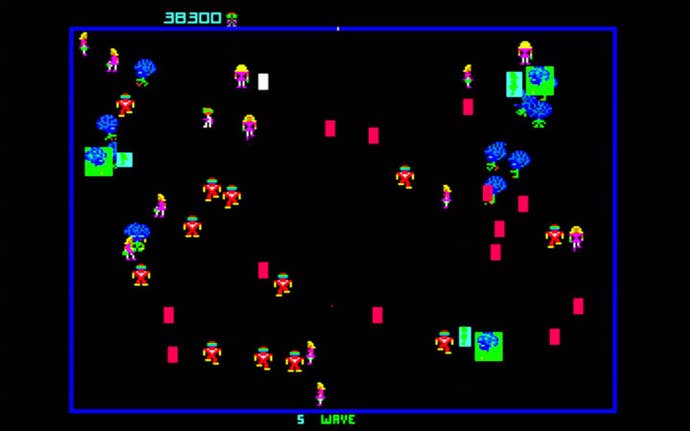
Jaz Rignall, Editor-at-Large
The trouble with nominating a game from 1982 as an all-time favorite is that it kind of infers that the games industry could well have packed up its bags at that point and moved on, having reached some kind of apex and everything else being downhill from there. That's simply not the case here - I'm just going back to the very roots of the shooter because of its incredible simplicity; the classic nature of its design that I just don't ever seem to grow tired of.
The game in point is Robotron: 2084, Eugene Jarvis' single-screen slice of genius that pits you against an ever-growing army of robots. I remember approaching it for the first time and seeing its twin joysticks and thinking that maybe it was some kind of co-op game. Nope. As I found out within a second or two, one stick moves you, and the other shoots. Brilliant! I remember thinking that was one of the coolest control schemes I'd seen at that point. Indeed I had: the very beginnings of the twin-stick shooter genre that's still well and truly alive and kicking today.
After another second or so, I'd pretty much learned the basics of the game, and from then on it was all about survival: blasting through wave after wave of different kinds of bots - all of which were out to get me. Oh, and picking up the humanoids for big bonus points too. That was another stroke of genius. You could certainly play through the game without picking up any humanoids, but if you didn't, you wouldn't really be earning enough points to garner the extra lives you needed as the game ramped up its difficulty level. You really needed to grab those extra bonus points, and that added a whole new layer of strategy to the proceedings.
Ultimately, Robotron: 2084 represents the roots of the twin-stick shooter: it's simple, stripped down and brutally difficult. That's what makes it such a great game for me. It has no pretentions and no gimmicks - it's just the basic DNA of the shooting game, and no matter how hard I try, I can never quite master it. That's why it keeps me coming back to play it, even now, some 33 years after first seeing it.
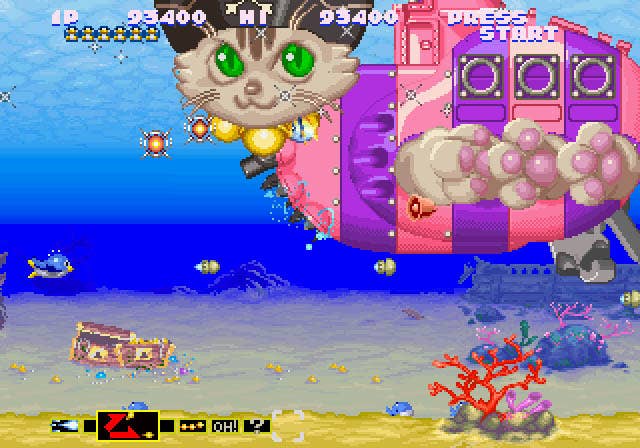
Bob Mackey, Senior Writer
I chose to interpret shooter as "shmup" for this question, if only because the answer came to me immediately. And if you've been paying attention, you might have noticed there's literally a reference to it in everything I write for USgamer—look at the little avatar next to my name, and you'll see an image of Pentaro from Konami's Parodius series. Sorry for the breach of ethics, but I'm not actually a cartoon penguin.
Truth be told, I was never a big fan of shooters, though I still held (and hold) an enormous amount of respect for them. Back when they were in vogue, I'd rent any that found their way into my video store, but these games—based mostly around memorization—aren't really designed to be completed in just a few days. So I'd usually get burned out by the second stage, and would soon find myself seeking out an experience that didn't rely on so much repetition.
It wasn't until the console emulation boom of the late '90s that I discovered if a shmup was going to hold my attention, it would need something bigger to distract me from the genre's inherent difficulty. Most shooters had amazing music, of course, but their visuals, while typically great, went with a pretty obvious theme: spaceships shooting at other spaceships. I never thought I'd find a shmup that actually deviated from the established formula until I loaded up a Super Famicom ROM with a curious name: "Parodius."
Now, if you don't know it well, let me explain: Once upon a time, Konami made a lot of video games. They made so many, in fact, that some of them were parodies of existing titles—and that's where Parodius come from. If you couldn't make a wild guess based on a name, it's essentially a parody of Gradius, featuring the same basic gameplay, dressed up in '90s anime weirdness. Konami's famous Vic Viper lends the series some legitimacy by acting as a playable character, but we also have the aforementioned Pentaro, an octopus, and Twinbee, the star of another Konami cute-em-up. Later games would expand the cast greatly, adding other Konami characters like Goemon, Ebisumaru, Kid Dracula, and Upa-Upa.
Each level basically exists as a tour of zany ideas delivered via the medium of beautiful sprite art—definitely some of the best of the 16-bit era. And really, the best part of Parodius is how nothing is really supposed to make sense; you'll dive under the legs of screen-filling Vegas showgirls, fight a massive penguin with a toilet strapped to his head, dodge the graceful spins of a fat panda ballerina, and fire at will at a battleship that somehow has the head of an adorable kitten grafted onto it. And all of this action is accompanied by a fantastic soundtrack that trots out classical music and traditional songs and dresses them up in an appropriately wacky way—the aforementioned kitty battleship fight features a remix of Stars and Stripes Forever, with synthesized meows replacing certain instruments. Now, do I really need to say anything more about Parodius? I didn't think so.
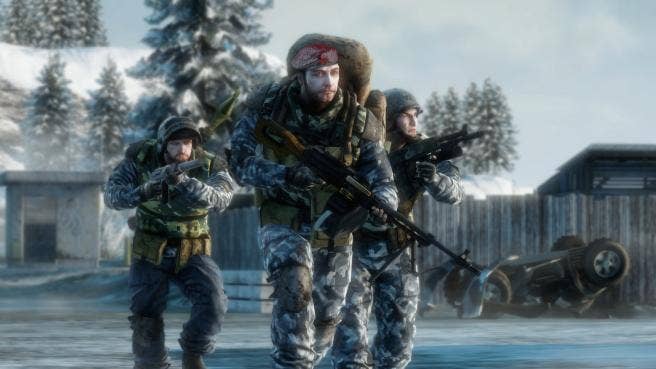
Kat Bailey, Senior Editor
Believe it or not, I'm tempted to pick Call of Duty 4: Modern Warfare. It's easy to forget amid all the military shooter fatigue that has taken hold over the past few years, but Modern Warfare was... ahem... a nuclear bomb in the shooter genre. It had a first-rate campaign loaded with memorable setpieces (Chernobyl was brilliant), and it completely changed how we view multiplayer. It sits with DOOM, Half-Life 1 and 2, and Halo as one of a handful of shooters that brought about a seismic shift in the genre.
In my heart, though, my favorite shooter is still Battlefield Bad Company 2. Battlefield tends to get lumped in Call of Duty, mostly because EA has positioned the series as a direct competitor to Activision's annual franchise, but it's always had its own flavor. Slower and more deliberate, it favors scope over speed, and teamwork over raw skill. Bad Company 2 is remembered fondly not just because it had a comparatively strong campaign, but because everything felt so balanced. The maps in particular managed to be big without being too big, effectively incorporating destructible environments without going overboard (like, say, Battlefield 4).
Battlefield Bad Company 2 was a major part of my rotation through the majority of 2010 as I mastered the four available classes, slowly but surely familiarizing myself with the various maps. I was primarily a tank driver, vehicles being one of the biggest reasons that I've long preferred Battlefield, and I would spend hours lurking about in an M1 Abrams, my turret ever at the ready. On the ground, I was primarily a Medic, reviving my fallen comrades with the defibrillator and wielding my LMG to great effect. It makes me kind of sad, actually, that the Medic class has been partly absorbed into what was Assault. I've since moved over to Engineer, mostly because I like vehicles so much.
Like everyone else, I moved on to Battlefield 3 when it came out, but it didn't quite resonate with me in the same way and I soon quit (I didn't stick around for all the expansions, which dramatically improved the multiplayer game). There have been more games since then, but none that have balanced scope, pacing, and vehicle as well as Bad Company 2. There are better shooters out there, but Bad Company 2 continues to stick with me as one of the most enjoyable multiplayer shooters I've ever played.

